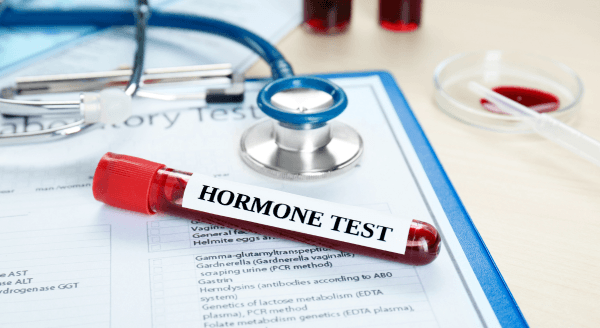

The Impact of Hormonal Imbalances on Neurological Health and Memory
by Zara Jethani
Hormonal Imbalances and Neurological Conditions

An imbalance in hormone levels can significantly contribute to several neurological conditions, with memory loss being a prominent associated symptom. Notably, approximately 65% of people with dementia are women. While the reasons behind this higher risk are not fully understood, it is hypothesized that changes in hormone balance due to aging play a critical role in the onset of dementia, particularly indicating a tendency towards Alzheimer’s disease.
The Role of Thyroid Hormones in Cognitive Health
Thyroid hormones play a critical role in maintaining cognitive health. These hormones, primarily thyroxine (T4) and triiodothyronine (T3), regulate metabolism and impact brain function by supporting the growth and repair of neurons, influencing neurotransmitter balance, and modulating cognitive processes. When hormonal imbalances occur due to conditions like hypothyroidism (low thyroid hormone levels) or hyperthyroidism (excess thyroid hormone), cognitive abilities can suffer.
In cases of hypothyroidism, common symptoms include brain fog, memory loss, and difficulty concentrating. This happens because reduced thyroid hormone levels slow down overall brain function, impacting areas responsible for memory and focus. On the other hand, hyperthyroidism can cause anxiety, restlessness, and difficulty focusing, as elevated hormone levels overstimulate the brain, leading to cognitive issues.Thyroid hormone imbalances can be associated with many problems, including mood swings, depression, and impaired cognitive function. Testing for thyroid function often involves measuring thyroid-stimulating hormone (TSH), which helps detect imbalances that may contribute to memory problems and other neurological symptoms.
Symptoms of a Hormone Imbalance in the Brain
Symptoms of a hormone imbalance in the brain can affect both cognitive and emotional well-being. The brain relies on a delicate balance of hormones, such as estrogen, testosterone, thyroid hormones, and cortisol, to regulate various functions. When imbalances occur, you might experience a range of symptoms:
Cognitive Impairments:
Memory loss or brain fog: Difficulty remembering things or staying focused is common in cases of low thyroid hormone (hypothyroidism) or cortisol imbalances caused by chronic stress.
Difficulty concentrating: High cortisol levels, often linked to stress, can impair focus and lead to mental fatigue.
Slow mental processing: Hormones like thyroid and sex hormones influence cognitive speed, and imbalances may slow mental functioning.
Mood Changes:
Depression or anxiety: Low estrogen, testosterone, or thyroid hormone levels can lead to mood swings, irritability, or depression. Elevated cortisol may contribute to anxiety or panic attacks.
Emotional instability: Rapid mood swings can result from fluctuating hormone levels, particularly during menopause, andropause, or thyroid dysfunction.
Sleep Disorders:
Insomnia or excessive sleepiness: Disrupted sleep is often related to imbalances in cortisol, estrogen, or thyroid hormones, impacting energy levels and overall cognitive health.
Physical Symptoms Affecting the Brain:
Headaches: These can result from conditions like thyroid imbalance or estrogen fluctuations during hormonal changes such as menopause.
Hormonal Imbalance Testing in Dementia Diagnosis

Hormonal testing is an important diagnostic tool for detecting hormone imbalance and assessing patients with dementia symptoms for age-related depletion of sex hormones. Following menopause, women experience a rapid decline in estrogen and progesterone levels. Similarly, men undergo an age-related loss of testosterone, a condition known as androgen deficiency or hypogonadism. These sex hormones have fundamental roles in maintaining cognitive and neural health, and their deficiency can exacerbate neurological conditions.
The Role of Sex Hormones in Cognitive Health
Sex hormones play a significant role in maintaining cognitive health, particularly in areas like memory, attention, and reasoning. Estrogen and testosterone, two key sex hormones, influence brain function by interacting with receptors in the brain. Estrogen, for example, has protective effects on neurons and supports the growth of new nerve connections. This is why women often experience changes in memory and cognitive function during menopause when estrogen levels decline. Similarly, testosterone affects areas of the brain responsible for attention and spatial abilities, and imbalances can lead to cognitive impairments.
For individuals with pituitary tumors, hormonal imbalances can significantly affect cognitive health. Since the pituitary gland regulates hormone production, any dysfunction or hormonal imbalance caused by a tumor can impact levels of estrogen, testosterone, and other hormones. Low or excessive levels of these hormones may contribute to mood swings, memory lapses, and difficulties with concentration.
The Impact of Menopause and Andropause on Cognitive Health
The transition through menopause in women and andropause in men involves significant hormonal imbalances that impact cognitive health. During menopause, estrogen levels drop sharply, leading to symptoms such as memory lapses, brain fog, and difficulty concentrating. Estrogen plays a protective role in the brain, supporting neurons and regulating neurotransmitters, so its decline can disrupt cognitive functions. Women often report issues with memory and focus during this stage due to hormonal shifts.
Similarly, andropause, often referred to as the male equivalent of menopause, involves a gradual decline in testosterone. This hormone is essential for maintaining brain health, particularly in areas like attention, motivation, and memory. Men may experience symptoms such as reduced cognitive sharpness, mood changes, and problems with short-term memory as testosterone levels decrease over time.
Both menopause and andropause contribute to hormonal imbalances that affect cognitive performance, but their impacts may vary. In men, testosterone’s steady decline tends to produce slower cognitive changes, while women may experience more abrupt shifts due to the rapid drop in estrogen. Additionally, the increased levels of cortisol, a stress-related hormone, during these life stages can exacerbate memory and concentration issues, as stress and hormonal imbalance often go hand-in-hand.
Hormone Replacement Therapy (HRT) for Hormonal Imbalance

Treatment of hormonal deficiencies through hormone adjustment and balancing can be achieved using bioidentical hormone replacement therapy (HRT). HRT is a potential therapeutic consideration for conditions like Alzheimer’s disease, where sex hormone deficiencies are evident. Bioidentical hormones are designed to be chemically identical to those the body naturally produces, providing a more natural approach to hormone replacement.
Hormone Imbalance Testing and Memory Loss
The pituitary gland plays a critical role in regulating various hormones, including those affecting memory and cognitive function. Hormonal imbalances can lead to symptoms such as memory lapses, depression, fatigue, and insomnia. Estrogen, for example, helps regulate cortisol, a hormone involved in stress response and neurotransmission in the brain. Declining estrogen levels can lead to elevated cortisol levels, contributing to memory loss and other cognitive impairments.
Comprehensive Hormone Evaluation and Treatment

A comprehensive hormonal evaluation can help diagnose and address these issues effectively. At our center, specialists provide suggestions for hormone imbalances using bioidentical hormone replacement therapy (HRT) along with personalized recommendations for diet, supplements, exercise, and lifestyle adjustments. These holistic approaches aim to restore hormone balance and improve overall cognitive health.
Types of Hormonal Tests for Imbalance
Testing for hormonal imbalances involves several key assessments, particularly blood, saliva, and urine tests, depending on the hormone in question. Blood tests are commonly used to measure levels of hormones like estrogen, testosterone, cortisol, and thyroid hormones. These tests help detect imbalances that may contribute to symptoms such as memory loss, fatigue, and mood changes. For example, abnormal estrogen or testosterone levels can impact cognitive function, particularly in older adults. Cortisol, a stress-related hormone, is also measured through blood tests, providing insights into adrenal function, which can affect memory and stress response.
Saliva and urine tests offer another method to assess hormone levels, especially for cortisol. Saliva tests are particularly useful for tracking daily fluctuations in cortisol, which can reflect chronic stress levels more accurately than a single blood test. Urine tests, on the other hand, are often used for more comprehensive hormonal assessments, measuring the metabolites of hormones throughout the day. These tests can help detect cortisol dysregulation, which is closely linked to memory and cognitive function, especially in cases of chronic stress.
Adrenal and Cortisol Levels
Chronic stress can lead to elevated cortisol levels, which are closely tied to memory and cognitive issues. Cortisol is produced by the adrenal glands, and its levels naturally fluctuate throughout the day. However, dysregulated cortisol levels—either too high or too low—due to prolonged stress can impair memory, concentration, and emotional regulation. This imbalance may manifest as difficulty remembering recent events or staying focused.
Doctors often test cortisol levels through blood, saliva, or urine to assess how well the adrenal glands are functioning. High cortisol levels may indicate chronic stress or an underlying issue such as Cushing’s syndrome, while low levels could suggest adrenal insufficiency or Addison’s disease. Both extremes can negatively affect cognitive health and overall well-being. Understanding cortisol patterns is crucial in diagnosing and managing conditions related to stress and adrenal function, and can guide treatments to restore hormonal balance and improve memory. Monitoring cortisol levels regularly is essential in developing effective strategies for managing stress and its cognitive impacts.
Memory Assessment Program
In addition to hormonal evaluations, our team has developed a memory assessment program to help diagnose a wide array of memory loss causes. This program includes thorough evaluations to identify specific factors contributing to cognitive decline and memory issues, enabling targeted treatment plans that address the root causes of these symptoms.
In Summary
Hormonal imbalances play a significant role in cognitive health and the development of neurological conditions such as dementia and Alzheimer’s disease. Through comprehensive hormonal testing and targeted treatments like bioidentical hormone replacement therapy, it is possible to address these imbalances and improve cognitive function. Our center at Pacific Neuroscience Institute® is dedicated to providing personalized care that encompasses hormone balancing, lifestyle modifications, and memory assessment to enhance overall cognitive health and quality of life.
For more information, contact the Pacific Brain Health Center’s Precision Brain Health program.
Brain Wellness & Precision Brain Health Specialists
Useful Links
Written and reviewed by:
The Pacific Neuroscience medical and editorial team
We are a highly specialized team of medical professionals with extensive neurological and cranial disorder knowledge, expertise and writing experience.
Last updated: June 20, 2024
About the Author

Zara Jethani
Zara is the marketing director at Pacific Neuroscience Institute. Her background is in molecular genetics research and healthcare marketing. In addition, she is a graphic designer with more than 20 years experience in the healthcare, education and entertainment industries.
Last updated: January 22nd, 2025







